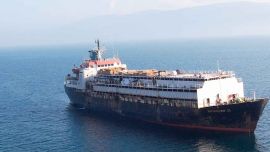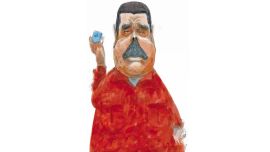From January 23 to February 3, the 12th edition of FIBA (Festival Internacional de Buenos Aires), presented by the Buenos Aires City Culture Ministry, will take over the whole of the nation's capital.
What makes the difference in 2019 is that this time the most important local performing arts festival has been scheduled for the summer instead of spring (it has been traditionally held between September and October, months where the weather is not always so pleasant and people are more stressed with everyday responsibilities). The present holiday season contributes to the goal of this edition expressed by its Artistic Director, Federico Irazábal: “without overlooking strictly theatre-based performances, it goes out searching for diverse stages around town (parks and squares, streets, auto-repair shops, roofs, bridges, bars and restaurants, among many others) and invites spectators to explore BA (…), willing to play the game of a fictionalised City and of a fiction set in and inspired for and by the City”. Irazábal also highlights that “this FIBA reaches out to the neighbourhoods with very diverse offerings for an also diverse spectator; a FIBA that strongly promotes Argentine production and work. The 12 FIBA takes its most radical turn and goes in search of a new narrative based on the premise that an event created more than 20 years ago cannot present itself under the same identity”.
In regard to the international program, it is worth mentioning that it was curated delving into the issue of otherness and how to reach out to meet the other. “The works that shape the international selection of 12 FIBA understand, in a radical way, that the world where we live has been seemingly unable to solve that problem and that the people, judging by many of their current democratic decisions, have opted for governments that guarantee the elimination of that other who upsets hegemonic subjects so much. And western theatre, as to be expected, appears to be seriously discussing this problem, in different realities and borderlands”, affirms the Artistic Director.
There are nine foreign productions that revolve from different perspectives around this topic. The opening of the Festival will take place in the open air at the Parque Centenario Amphitheatre with The New Colossus (United States), a play that tells the true stories of 11 people who come from different countries and who are here today because their families fled from constant struggle for survival and moved toward safety and freedom throughout the last 300 years. Written and directed by no less than Academy Award actor Tim Robbins, the piece is produced by his company The Actors’ Gang, which was founded in 1981 and has over 200 productions and more than 100 awards to their credit.
Also following the idea of confluence of different cultures in the same play, Sachli Gholamalizad is a Belgian actress and playwright of Iranian descent who in A Reason to Talk attempts to uncover the reasons for her strained relationship with her mother. In this process, what comes up is the disjunction between finding them in the difference of cultures or in the universal issues between mothers and daughters.
There are, as well, two very original productions coming from France and Italy. The Cliffs of V., directed by Laurent Bazin, is one of the first French narrative experiences mixing performance and virtual reality, and Macbettu is a version of Shakespeare’s Macbeth by Alessandro Serra, played in Sardinian and, in the purest Elizabethan tradition, by an all-male cast. On the other hand, Collection of Lovers by Raquel André (Portugal) and Vegetative State by Manuela Infante and Marcela Salinas (Chile) are both one-woman performances where femininity is connected with (fake or real) intimacy in one case, and with the world of plants in the other.
Dance will also have its space in this Festival through Nakedness by Compañía Daniel Abreu -one of Spain’s most renowned companies in this field-, and Moving with Pina. A Lecture Performance on the Poetry, Technique and Creativity of Pina Bausch by Italian Cristiana Morganti, long standing soloist in the Tanztheater Wuppertal, the legendary theatre-dance company Bausch created in Germany in 1973.
The Festival will close with Atlas des Kommunismus, a Maxim Gorki Theater production (Germany) directed by Argentine Lola Arias (another confluence of people from different histories and nationalities). More than 100 years after the October Revolution in Russia and following her documentarian poetics, this internationally acclaimed artist invited people aged from 10 to 86 to the stage to tell stories of lives affected by the socialist idea. Together they talk about communist work songs, the teachings of socialist brother countries, surveillance in everyday life, the asylum centres set on fire in Eastern Germany, and refugees’ demands today.
The FIBA also offers an excellent opportunity to get in touch with local productions (site-specific or traditional performances by very talented and prolific creators), bearing in mind that Argentine theatre is one of the best ambassadors regarding culture activity abroad. As Irazábal emphasizes, the national huge and varied program (that in this edition launches new sections such as Maratón Abasto and Ciudanza) is really “a brief showcase of how much is produced here, which reflects why our country is considered the biggest venue for theatre in Spanish”.
To buy tickets and check free-entrance shows, and for further information about the whole FIBA schedule, which also includes special activities: http://festivales.buenosaires.gob.ar/























Comments